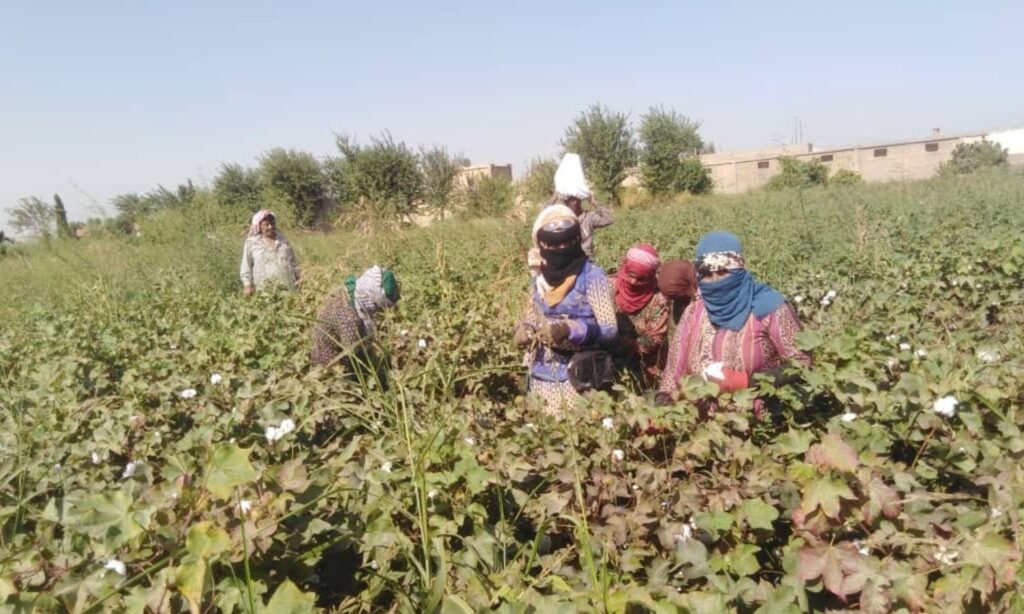Duaa (26 years old) is forced to work in a workshop in the agricultural sector due to tight living conditions, as there is no one to support her financially after the death of her parents. She shares these burdens with her sister, who works in a retail store.
Duaa (living in the countryside of Homs) told Enab Baladi that she works throughout the year, despite the harsh conditions during some periods of summer and winter, and what she earns barely covers her needs for food and clothing.
Duaa joins a group of women working in agricultural workshops to harvest crops or care for vegetables during the season.
“Um Maher” (68 years old), who organizes the work of an agricultural workshop in rural Homs, stated that the workers in her establishment often work for about ten hours a day, with wages being low, not exceeding 7,000 Syrian pounds (approximately half a US dollar) for weeding, reaching up to 10,000 pounds during harvesting, and 15 pounds for olive picking.
Thus, the daily wage for a worker ranges, at best, between 5 and 10 dollars if she works for ten hours.
However, work is linked to the timing of planting and harvesting crops, meaning it can be intermittent and cannot be solely relied upon.
Um Maher mentioned to Enab Baladi that she has 20 female workers in her workshop whose number fluctuates based on their circumstances, as many leave work after marriage.
Unprotected labor
Hanan (29 years old), a mother of three, tries to help her husband cover household expenses and living necessities through her work in the agricultural fields.
Hanan told Enab Baladi that she has to leave her children with their grandmother or a neighbor, and sometimes she leaves them alone at home. If one of them falls ill, she stops working until they recover.
The agricultural workers in rural Homs with whom Enab Baladi contacted confirmed that they do not receive assistance or benefits, such as health insurance, and they face exploitation and harassment from some landowners.
To address this problem, the workers report issues to the workshop owner, who sometimes suspends work if the landowner does not stop violating the rights of the girls.
Most of the workforce in the agricultural sector is not registered in labor unions and has no form of insurance or mutual support. Women and children make up a significant percentage of agricultural labor, especially in olive picking, fruit tree harvesting, and weeding.
Agricultural workers have no legal protection in case of injury, unpaid wages, or deductions. They work without contracts and are unaware of their legal rights.
What does the law say?
Decree No. 134 of 1958 organized the relationship between landowners, farmers, and agricultural workers, defining agricultural workers as any male, female, or adolescent engaged in agricultural work for pay under a landowner or farmer’s direct management, either through a specific or common oral or written contract.
The decree set the agricultural worker’s wage to be no less than a minimum that provides for their basic living expenses and helps them cope with the demands of life.
According to the decree, landowners and their agents who are proven to pay wages below the set minimum will be fined between 50 and 200 Syrian pounds for each violation, with the penalty doubling in case of recurrence.
This penalty is currently very low, as the US dollar is equivalent to 14,750 Syrian pounds, according to the S-P Today website that specializes in currency prices.
Agricultural workers are also subject to the Agricultural Relations Regulation Law No. 12 of 2011, which prohibits employing minors (those under 15 years old) in agricultural work without the written consent of their guardians.
The law also states that a worker with an indefinite contract, or who has worked for the employer for six months or more, when proven to be sick by an accredited physician, is entitled to receive 70% of their wages for the following 90 days, which increases to 80% thereafter within the same year.
Employers are also prohibited from terminating or warning their workers about termination during the sick leave period.

